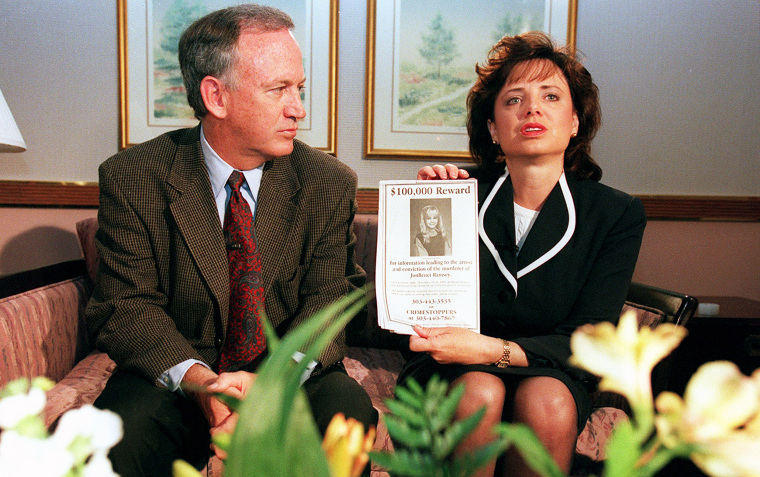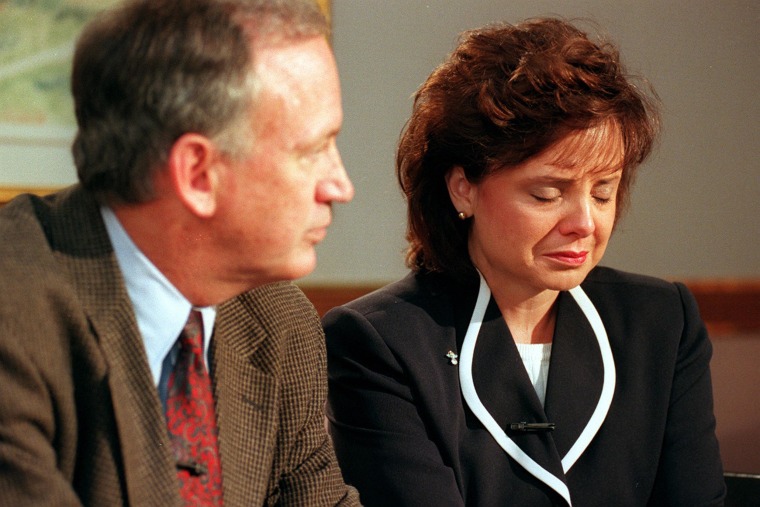In the years following JonBenét Ramsey’s murder, her mother, Patricia “Patsy” Ramsey, fought to track down her daughter’s killer — and she always fiercely denied accusations that she and her husband, John Ramsey, had anything to do with JonBenét’s killing.
Ramsey also opened up about her belief that she would one day be reunited with her late daughter.
“We have to know and believe in our faith that we will see JonBenét again,” Patsy Ramsey said on “Larry King Live” in 2000. “She is in Heaven with our Heavenly Father and one of these days … we will be there with her, and we live for that day. That’s what keeps us going.”
Ramsey died in 2006 from ovarian cancer, but she remains a strong presence in a new Netflix documentary, “Cold Case: Who Killed JonBenét Ramsey,” which features extensive archival interviews with Patsy Ramsey, her husband and others tied to the case.
The director of the three-part series, Joe Berlinger, says he is convinced Patsy Ramsey was not guilty of her daughter’s murder.
“It defies logic to think that Patsy could have done this,” he tells TODAY.com.
He adds that based on details in JonBenét’s autopsy, he believes only a skilled killer could have inflicted the injuries that JonBenét suffered.

“Does anyone really think that Patsy Ramsey had the presence of mind and the ability to torture her daughter in that way with a device that’s kind of hard to make?” he says, referring to a device called a garrote that was used to strangle the child, per the official autopsy.
“Just the autopsy itself tells you there’s no way that this could have been done by anything other than a knowledgeable, deeply disturbed person who knew how to do this,” he says.
He adds that he created the documentary partly in the hopes of finding justice for John Ramsey, the late Patsy Ramsey and the rest of JonBenét’s family.
“As maker of (true crime) content I always ask myself … are we just wallowing in the misery of other people, or is there a social justice component to telling this story?” he says. “For me, the social justice component is, let’s find out once and for all who the killer is. This family deserves the knowledge.”
He also shares his belief that while the Ramseys were never convicted of murder, he believes they were “wrongfully convicted in the court of public opinion.”
“I can think of no other family that has had that’s been so brutalized by the American media and by the justice system than this family,” he says.
Keep reading to learn more about what happened to JonBenét Ramsey’s mother, Patsy Ramsey, and what she said about her daughter over the years.
What happened to Patsy Ramsey?
Patsy Ramsey died at 49 from ovarian cancer on June 24, 2006.
She had initially been diagnosed with ovarian cancer in 1993, and had been in remission for about nine years before the cancer returned three years before her death, according to NBC News.
Patsy Ramsey died at her father’s home near Atlanta, Georgia, with her husband, John Ramsey, at her side. She was buried in a grave next to her daughter’s in Marietta, Georgia.
In the documentary, John Ramsey opened up about the “devastating” recurrence of his wife’s cancer, and explains that after attempts to treat her illness, a doctor eventually recommended palliative care.

“We weren’t ready to do that. I wanted her to keep fighting, she wanted to keep fighting. And then it got to a point where I was convinced it was hopeless, and I made the decision to stop, at the doctor’s recommendation, to stop treatment,” he said.
“I didn’t tell Patsy. The cancer had migrated to her brain so she was not her normal self, so she didn’t know that we’d given up,” he continued. “And she would ask, ‘When’s my next treatment?’ and I knew in my heart there was no next treatment. That was hard.”
In the years before her death, Patsy Ramsey remained determined to find the identity of her daughter’s killer.
Lou Smit, a police detective who long argued that an intruder, not the Ramseys, had murdered JonBenét, once shared Patsy Ramsey’s last words to him.
“The last words she said to me were, ‘Lou, I don’t have much time left. Please catch this guy before I die,’” he said in an interview clip excerpted in the documentary.
In a clip shared in the documentary from a 2006 appearance on New Hope Church TV, Patsy Ramsey shared her belief that she would be reunited with JonBenét after she died, along with her stepdaughter, Beth, who died in 1992 in a car accident.
“I don’t know how long I’ll live. But I know that when I’m absent from the body, I will be at home with the Lord, and JonBenét and Beth, and my mother who has since passed away,” she said. “You know, all the fun people are starting to be over there, so it’s going to be a glorious reunion.”
In the documentary, John Ramsey shared his belief that his late wife now knows what happened to JonBenét.
“We’ve been asked, ‘You know, it’s really too bad that Patsy passed away without knowing who killed her child.’ And she knows now, I believe,” he said.
“I will see Patsy again. I have no doubt,” he continued. “I don’t know how that’s going to work, or how it’s going to happen. It’s too beyond my little brain to comprehend, but I believe that that’s a reality for us as humans.”
What did Patsy Ramsey say about her daughter?
Patsy Ramsey always maintained that she and her husband had not been involved in JonBenét’s murder, and pushed for her daughter’s killer to be found.
She shot down allegations that she had killed JonBenét in a fit of rage after her daughter wet the bed.
“Does someone actually think I would kill my child because she wet the bed?” Ramsey said in a 1999 CBS News interview. “I mean, I have lived through Stage 4 cancer. In the grand scheme of things, bedwetting is not important.”
Ramsey also criticized the way her daughter’s homicide case was handled by law enforcement.
“The police that were there the morning of the 26th, taking evidence, have a lot of tangible evidence. They did a good job at collecting evidence. We have fibers. We have DNA. We have a lot of evidence,” she said during an appearance on “Larry King Live” in 2000. “The problem was that then they did not take the evidence to where it would lead.”
She also told King that in hindsight, she and her husband “should never have moved to Boulder, Colorado.”
“I mean, if you want to go back … But you can’t do that,” she said. “You have to start with what we have now. We have to move ahead. We have to try to find this killer and get him off the street.”
In 2000, John and Patsy Ramsey co-wrote a book about their daughter’s murder and its aftermath called “The Death of Innocence: The Untold Story of JonBenet’s Murder and How Its Exploitation Compromised the Pursuit of Truth.”
In the book, Patsy Ramsey defended her daughter’s involvement in beauty pageants, saying JonBenét begged her to participate in them. Ramsey, who had also competed in pageants, said she bonded with her daughter over the experience.
“I decided if this was what she liked to do, then I would see if I could make it possible. I always worried that my cancer would return someday, so I was glad to have found an activity that we could have fun with together,” she wrote in the book.
“Mother-daughter experiences were to be treasures for me, now more than ever before,” she continued. “If God did take me before she grew up, I reasoned, I could leave her these memories.”
After her daughter’s death, Ramsey shared her appreciation for people who hung angels on the tree above JonBenét’s grave.